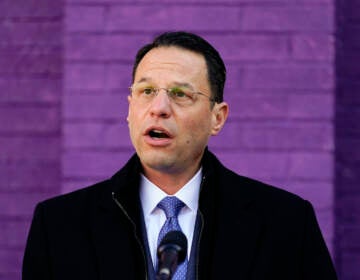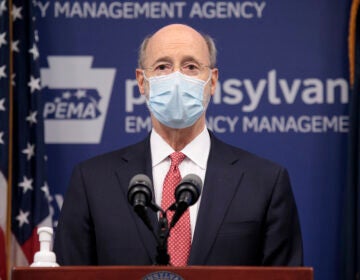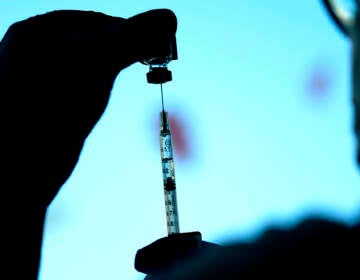Coronavirus update: Wolf announces a new batch of yellow counties, for a total of 49
Lawmakers from counties under restrictions have been agitating for a faster reopening and there’s another protest against the shutdown occurring at the capitol this morning.
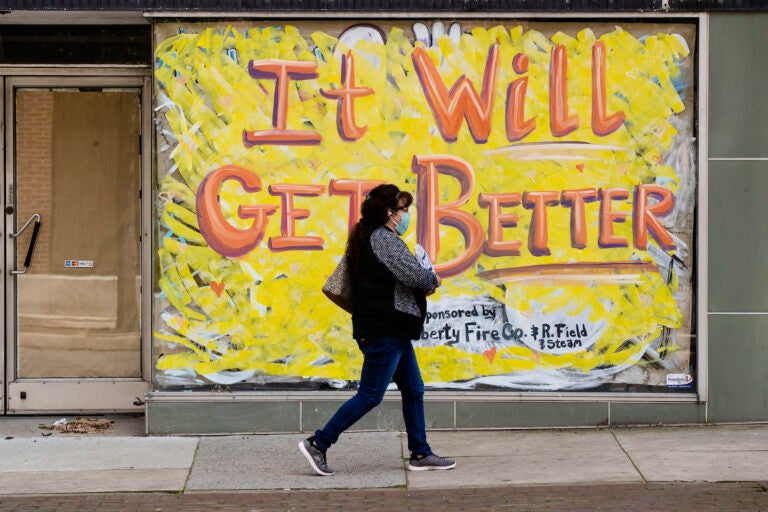
A person wearing a protective face mask as a precaution against the coronavirus walks by a closed storefront in Lebanon, Pa., Tuesday, May 12, 2020. (AP Photo/Matt Rourke)
Updated at 4:00 p.m.
–
Are you on the front lines of the coronavirus? Help us report on the pandemic.
Pennsylvania recorded 1,031 new positive COVID-19 cases Friday, a 1.63% increase in total cases over the previous day. Over the past seven days, the commonwealth has recorded an increase of 6,765 cases, or 11.79%.
The state has recorded 64,136 positive cases so far out of more than 330,409 tested.
Statewide, Pennsylvania had 133 new deaths as of Friday, for a total of 4,226. The Department of Health says this is the result of “continued work to reconcile data from various sources,” and that the deaths have occurred “over the past several weeks.”
Philadelphia reported 256 new positives Friday. The city has recorded 19,349 cases so far, and 1,021 deaths.
Wolf announces a new batch of yellow counties, for a total of 49
Gov. Tom Wolf kicked off his daily coronavirus press conference Friday with an acknowledgement that lockdowns are difficult, and are taking their toll on Pennsylvanians’ economic and mental well-being.
“We want to go to work. To the store. We want to see our friends. And with each passing day it becomes harder and harder to stay home,” he said.
It’s a tack Wolf’s been taking more frequently, as county officials and politicians across the commonwealth have begun to publicly chafe at broad closures. But after acknowledging the sacrifices people are making, Wolf doubled down on the plan he has stuck to for several weeks — to reopen counties week by week based on case counts and a flexible array of other factors.
He said he’s lifting stay-at-home and business closure restrictions as quickly as he thinks it’s safe, but that he is also taking medical professionals’ advice seriously.
“As the leader of this commonwealth, I’m responsible for the health and safety of all Pennsylvanians,” he said. “I can’t, and I will not let this virus ravage our communities.”
That said, Wolf also announced he is letting 12 additional counties move from the most stringent lockdowns in the “red” phase of his reopening plan, to the middle ground of the “yellow” phase.
They are Adams, Beaver, Carbon, Columbia, Cumberland, Juniata, Mifflin, Perry, Susquehanna, Wyoming, Wayne, and York
They join 37 other counties that have already moved or are moving into “yellow.”
Department of Health Secretary Rachel Levine addressed reporters alongside Wolf, noting that with more than 60,000 people having been infected with coronavirus in Pennsylvania, and more than 4,000 dead, it appears the commonwealth is definitely past its peak of infections.
She added though, some areas have “only just” begun seeing meaningful declines.
If areas that are moved into the “yellow” phase see COVID-19 outbreaks, they can be quickly moved back to “red.”
“We are monitoring very carefully…any potential clusters or outbreaks in all of the counties, but particularly looking now at the counties that have gone from red to yellow,” she said.
Wolf also addressed the several counties that have recently announced they intend to move to the “yellow” phase without the state’s permission.
He called the impulse to buck stay-at-home orders a “realistic and reasonable expression of frustration,” but added that he thinks that frustration should be targeted at the virus, not at him.
After promising harsh repercussions for rule-breaking counties and businesses earlier in the week — like loss of funding and state licenses — Wolf appeared less eager, on Friday, to focus on enforcement.
“Ultimately, you’re looking at this virus — the virus is the thing that’s setting the rules here. Not me, not the federal government, not the county,” he said.
But, he added, “it always makes me wonder how somebody elected to public office to enforce the law is actually out there saying they’re going to break it.”
Philly reopening depends on the data
While data shows a decline in the number of cases and deaths in Philadelphia, Mayor Jim Kenney remains unclear on when the city will reopen.
“This is all a data game,” said Kenney. “As soon as Dr. Farley feels comfortable that we can move in a faster or forward direction, that’s where we’ll go. But until that, we’re not going to be caught up in this open-up hysteria that everyone in the country is dealing with.”
Philadelphia Health Commissioner Thomas Farley showed a series of graphs illustrating the city is on the downside of the pandemic.
Farley reported 256 new positive cases, bringing the total to 19,349 citywide. Hospitals are also seeing fewer patients, with 694 in city hospitals as of this morning and 1,296 in the region. That reflects a steady decline over 10 days.
There have been 13 new deaths adding to a total of 1,021 for the city. More than half of those deaths have occurred in nursing homes.
Farley says 256 is a big drop from the number of positive cases in April, but “it’s still an awful lot of cases.” The health commissioner says it’s still too early to predict when reopening will be safe.
SEPTA general manager Leslie Richards joined the briefing to announce SEPTA’s return to regular service for most of its transit service next week.
She also said more than 100 workers have recovered from the coronavirus. The authority has more than 270 positive cases and seven deaths among its workforce.
Recycling will continue to be picked up every other week through June 26.
Most SEPTA transit service to return next week
Most of SEPTA’s transit service will return next week with buses, subways, the Norristown High Speed Line and trolleys running on regular weekday and weekend service. Front-door boarding and on-board fare payment will return as well.
Service will not quite be back to normal. Several subway stops will remain closed, and some bus and trolley routes will remain suspended or on a reduced schedule. More details can be found on SEPTA’s website.
SEPTA had implemented a series of changes to its service in response to the COVID-19 crisis that resulted in the suspension of about half of its bus and trolley routes and on-board fare collection. It also implemented a rear-door boarding policy, and a new schedule to address reduced staff.
SEPTA general manager Leslie Richards told PlanPhilly riders can expect some challenges as more operations come back online Sunday.
“This service is not going to be perfect but it is what we can do right now to serve essential workers and obviously prepare for the expected increase in service needs in the coming weeks,” said Richards.
The authority still discourages nonessential travel and plans to continue social distancing protocols. Also, riders are still encouraged to wear face coverings.
WHYY is your source for fact-based, in-depth journalism and information. As a nonprofit organization, we rely on financial support from readers like you. Please give today.



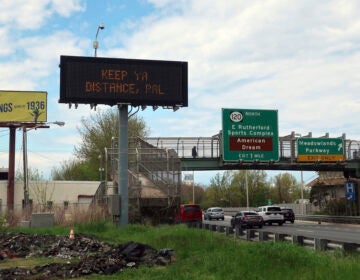
![CoronavirusPandemic_1024x512[1]](https://whyy.org/wp-content/uploads/2020/03/CoronavirusPandemic_1024x5121-300x150.jpg)
